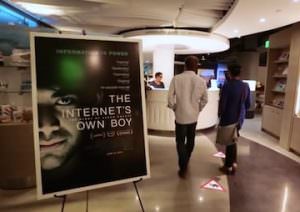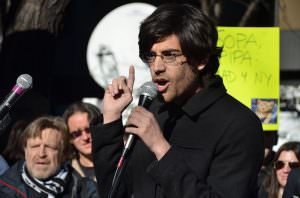Aaron Swartz: The Life We Lost and the Day We Fight Back
A year after Internet freedom activist Aaron Swartz's suicide at the age of 26, a film about this remarkable young man has premiered at the Sundance Film Festival.
PARK CITY, Utah — A year after Internet freedom activist Aaron Swartz’s suicide at the age of 26, a film about this remarkable young man has premiered at the Sundance Film Festival. The film, titled “The Internet’s Own Boy: The Story of Aaron Swartz,” directed by Brian Knappenberger, follows the sadly short arc of Aaron’s life. He committed suicide while under the crushing weight of unbending, zealous federal prosecutors, who had Aaron snatched off the street near the Massachusetts Institute of Technology, accusing him of computer crimes.
At the age of 14, Aaron helped develop RSS, “Really Simple Syndication,” which changed how people get online content. He co-founded one of the Internet’s most popular websites, Reddit. In the year before his death, he helped defeat a notorious bill before Congress, the Stop Online Piracy Act (SOPA), which would have granted corporations sweeping powers of censorship over the Internet. Now, another fight for the freedom of the Internet has begun. This one will have to be waged without Aaron.
A coalition of Internet activists, technologists and policy experts are joining together on Feb. 11 for “The Day We Fight Back.” As they say on their website, reflecting on the victory against SOPA, “Today we face a different threat, one that undermines the Internet, and the notion that any of us live in a genuinely free society: mass surveillance. If Aaron were alive, he’d be on the front lines, fighting against a world in which governments observe, collect, and analyze our every digital action.” Before Edward Snowden made “NSA” and “mass surveillance” household terms, Aaron was speaking out against the National Security Agency’s bulk collection programs. His brother, Noah Swartz, told me, “I think Aaron’s message that we can all take with us is that … we can see the change we want to see in the world by participating, rather than feeling helpless and useless.”
The legal case that was overwhelming Aaron was brought by Assistant U.S. Attorney Stephen P. Heymann and U.S. Attorney Carmen Ortiz. When Aaron was a fellow at Harvard University, he went to nearby MIT, which allowed members of the public to use its computer network, and to access resources on it, including the database of digitized academic research articles maintained by the nonprofit company JSTOR. He wrote a computer program that allowed a laptop to automatically download articles, and proceeded to download millions of them. JSTOR noticed and contacted MIT, and MIT in turn contacted the police.
The Computer Fraud and Abuse Act was enacted in 1986 to prosecute people engaged in credit-card fraud or threatening national security. Since Aaron, like any member of the public, had permission to use MIT’s network, he was not committing fraud. Aaron felt that the academic articles represented a cultural commons that should be shared. JSTOR decided not to press charges. Yet the federal prosecutors went ahead anyway.
Aaron’s father, Bob Swartz (who, ironically, is a consultant for the MIT Media Lab), says what followed was a “nearly sadistic prosecution.” Aaron’s defense attorney, Elliott Peters, told me, “Aaron wasn’t a thief. … He certainly downloaded more of JSTOR than they wanted, but it wasn’t to steal anything.” Aaron refused to accept a plea bargain, which would have made him a felon. He was facing 35 years in prison and a $1 million fine.
Bob Swartz is incensed at MIT, who, he said, “cooperated with the prosecutor. They provided the prosecutor evidence without a subpoena and a warrant. They violated any number of laws. … They also refused to cooperate with us, give us evidence, and we had very significant difficulty even getting them to respond.” Peters alleges prosecutorial misconduct, saying that Heymann withheld exculpatory evidence and more. Even now, a year after Aaron’s death, Peters and the Swartz family are still trying to get all the documentation from federal prosecutors. They are also working with Congressmember Zoe Lofgren, D-Calif., to pass “Aaron’s Law,” which would reform the Computer Fraud and Abuse Act to eliminate the overbroad language that gives prosecutors a license to charge trivial computer behavior as a felony.
In the meantime, his brother, Noah, is actively organizing for the Feb. 11 Day We Fight Back against mass surveillance. In a speech after the defeat of the SOPA bill, Aaron Swartz recounted the truly grass-roots, global nature of the protests. He left the crowd with this call to action: “If we let them persuade us we didn’t actually make a difference, if we start seeing it as someone else’s responsibility to do this work … then next time they might just win. Let’s not let that happen.”
Denis Moynihan contributed research to this column.
Amy Goodman is the host of “Democracy Now!,” a daily international TV/radio news hour airing on more than 1,000 stations in North America. She is the co-author of “The Silenced Majority,” a New York Times best-seller.
© 2014 Amy Goodman
Distributed by King Features Syndicate
Your support is crucial…With an uncertain future and a new administration casting doubt on press freedoms, the danger is clear: The truth is at risk.
Now is the time to give. Your tax-deductible support allows us to dig deeper, delivering fearless investigative reporting and analysis that exposes what’s really happening — without compromise.
Stand with our courageous journalists. Donate today to protect a free press, uphold democracy and unearth untold stories.







You need to be a supporter to comment.
There are currently no responses to this article.
Be the first to respond.